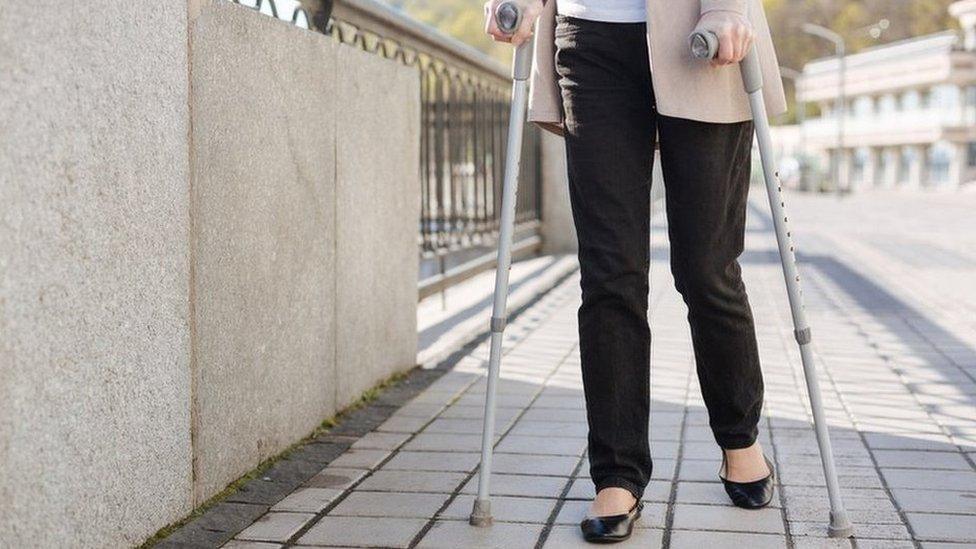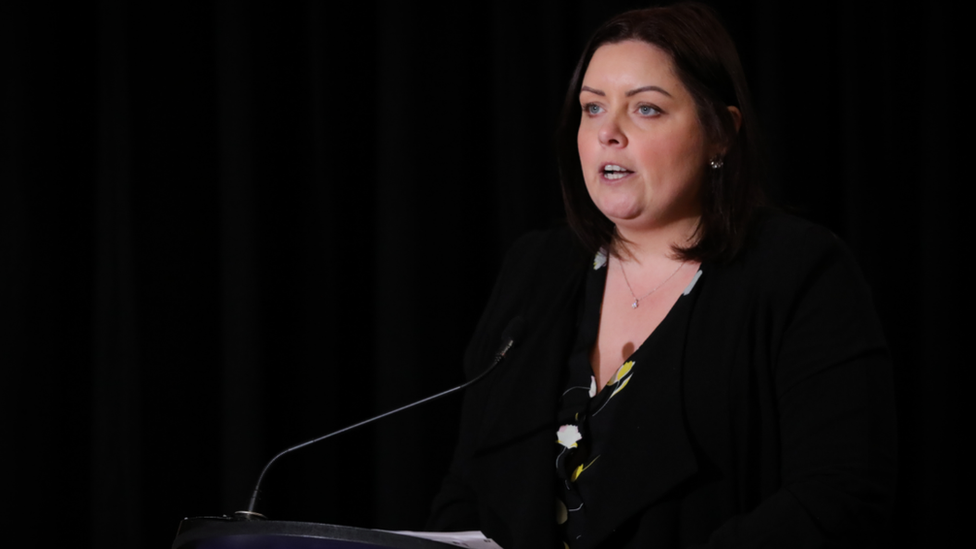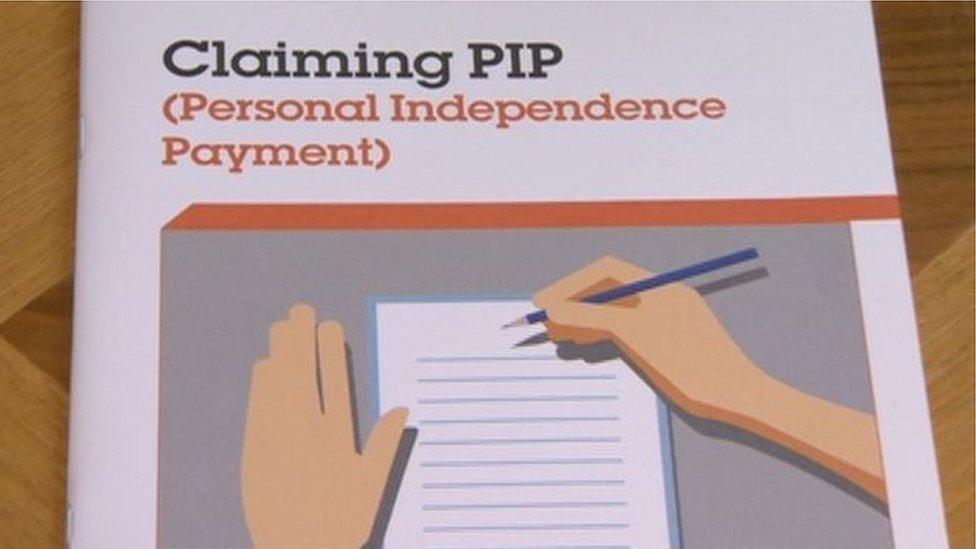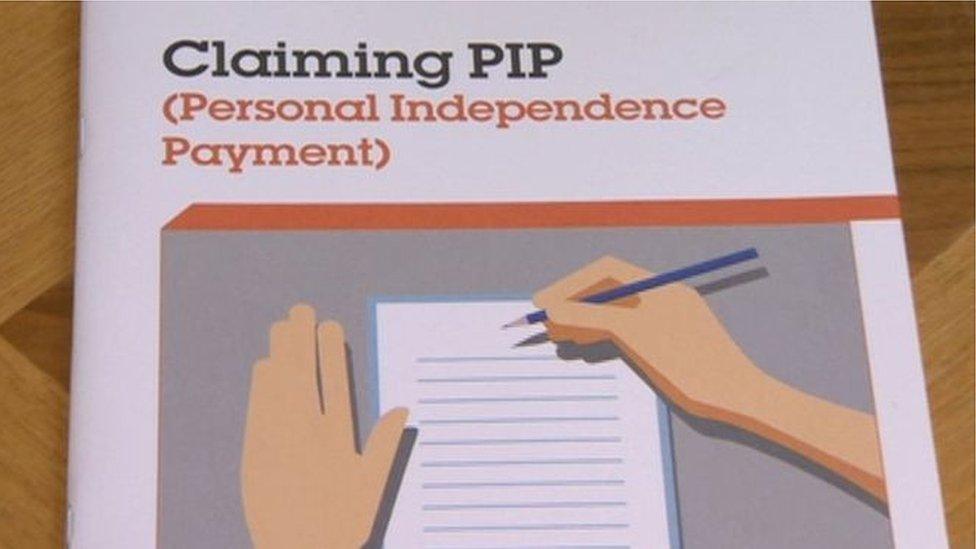PIP claims: Too many Northern Ireland people 'unfairly rejected'
- Published

Personal Independence Payments replaced Disability Living Allowance in 2016
Too many people in Northern Ireland have had claims for their Personal Independence Payment (PIP) "unfairly rejected", an investigation has found.
The damning report conducted by the Public Services Ombudsman Margaret Kelly was published on Thursday.
It found that applicants were kept "in the dark" by the Department for Communities and Capita, which carries out PIP assessments.
The communities minister said she was "committed" to "positive change".
Capita said it will review the findings of the report.
PIP replaced Disability Living Allowance (DLA) in 2016.
Ms Kelly's office carried out a 20-month investigation into complaints about the new system, which provides benefits to some of the most vulnerable in society.
PIP claims: 'It was a humiliating process'
In her report, she stated that "repeated opportunities were missed to make the right payment as early as possible in the process".
It found that both the department and Capita often failed to seek and use further evidence, including that from medical professionals, in its assessments.
This meant claimants had to "continually challenge the decision, often all the way to appeal, before the correct decision was made", the report stated.
It said the repeated nature of these failings constituted "systemic maladministration".

'Intrusive, cold and calculated'
Londonderry woman Sinead Quinn, who lives with both physical and mental health conditions, said she was not surprised by the findings of the report.
She first applied for PIP in 2018 at a time when her health was "particularly fragile".
In the years since, her experience of the system has been "absolutely horrific".
"Every step of the way it is, in my opinion, set up to put people off," she told BBC Radio Foyle.
It is a process that is "distressing and terrifying", she said.

Sinead Quinn believes the PIP system is designed to deter people from applying
Three years ago she was awarded PIP after being assessed twice - after assessors lost her first assessment, she was called back three weeks later to undergo the process again.
Earlier this year, she was reassessed during a one-hour phone call. It led to her payment being slashed.
It was "intrusive, cold and calculated", she said.
Ms Quinn added: "To be able to go on the telephone with someone you don't know, as someone who struggles with mental health problems, is a massive challenge."
She said that the process involved "very personal questions about how your disabilities affect you" and that the people were "not actually taking into consideration what you are saying".
She recalled breaking down three times during the assessment.
"But my mental health was absolutely fine according to the assessor," Ms Quinn said.
"How the decision was reached was completely inadequate.
"They didn't even ask for any medical history from my GP. I have no idea how a one-hour conversation can give you a window into someone's health for the last three years, or into the next three years," she said.

The ombudsman advised Capita and the department to "shift their focus to ensure that they get more of the PIP benefit decisions right the first time, so that the most vulnerable people in our society get access to the support that they need, when they need it".
Ms Kelly said this would also safeguard public resources by reducing both the time and costs associated with examining the same claim on multiple occasions.
Among the investigation's findings were:
Many PIP claimants received correspondence from Capita that said all health professionals listed had been contacted, when in fact this was not the case
Only one of the 96 cases considered included a request for further evidence after the initial review
The most common reason for not requesting further evidence was that "it was unlikely to be obtained within the timescale required", despite the fact that there were six weeks available to gain evidence
Capita used information on the number of assessment reports completed and submission times to decide on salary bonuses for disability assessors; these had the potential to inhibit the appropriate use of further evidence in making assessments
Despite Capita and the department's contention that further evidence has a key role in the PIP process, it was often only following the submission of an appeal to the tribunal that the role of further evidence was elevated
Too many vulnerable claimants may not have been identified for additional support at the start of the PIP process because of the department's narrow interpretation of its own guidance
'Not fit for purpose'
Foyle MLA Mark H Durkan, of the SDLP, described the report as "unequivocal proof of systemic maladministration".
A persistent critic of the PIP system, Mr Durkan said the "the system is plagued by a litany of failures, inherent deficiencies and is not fit for purpose".
"The report is scathing on Capita's performance and questions really now need to be asked of Minister [Deidre] Hargey as to why she has extended their contract for a further two years," Mr Durkan said.
"Ultimately, people are not getting the support or dignity they deserve," he added.

Deirdre Hargey says she welcomes "the opportunity to drive further improvements in the service"
In a statement, Communities Minister Deirdre Hargey said she was "firmly committed to enacting positive change in PIP delivery".
Ms Hargey said her department has "consistently demonstrated that commitment by taking forward recommendations from statutory reviews previously carried out by Walter Rader and Marie Cavanagh".
"I remain open to scrutiny and welcome the opportunity to drive further improvements in the service to ensure it is delivered in a compassionate and empathetic manner," she added.
In a statement, Capita said: "We strive to continuously improve the PIP assessment process that we deliver on behalf of the department.
"We are committed to delivering a professional, efficient and kind service for every PIP applicant we assess."

'Beggar's belief'
Samantha Gallagher, who helps claimants with PIP issues, said she was not shocked by the report's findings as she finds the claims process very difficult.
Ms Gallagher, who works at Community Advice in Fermanagh, said medical evidence was being "disregarded by assessors" and she cited an example of one claimant whose PIP award was substantially increased on appeal.
"It beggars belief that weight wasn't given to letters coming from consultants and neurologists and GPs - there are no words at times," she told the BBC's Good Morning Ulster programme.
Ms Gallagher said she believed the claims process was designed to be difficult to discourage fraudulent claims, but added that the majority of claimants were in genuine need and were suffering as a result.
"What we need to remember here is this is a health-related benefit - so it's about people who have ill health. They need respect, they need to be treated with dignity," she said.
"So far from what we can see, especially from the outcomes of this report, that has not been happening. We just need to remember we're dealing with people, not numbers."
Related topics
- Published9 October 2019

- Published9 November 2020
